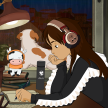Breadcrumbs for Girlhood.
A tale weaving the best of fairytales together for one girl growing older.

Sometimes, it is the quiet stories that speak the loudest. Perhaps that's why I never fell in love with the Harry Potter series like so many others. I had no trouble suspending my disbelief for magic and mystery, but few characters from the series stuck with me. They were either too awkward, too talented, too proud, too evil, or too good. Moments that were meant to resonate with children coming-of-age always seemed to miss the mark. Every single character 'fit,' even if they made a blunder or were an outsider, they all belonged on the chessboard, with their unique moves.
Although many criticize the extremely talented, intelligent, and confident children's protagonists, many forget that novels can sometimes lean too hard into the shy young girl trope. One novel I loved growing up, Cicada Summer by Andrea Beaty, had a protagonist who was a tad too shy. Her introversion appeared almost magical in the realistic setting. The selective mutism seemed to function as a complete invisibility cloak, allowing her to spy indiscriminately and have teachers completely ignore her. I won't reveal the cause of her selective mutism for fear of ruining the novel. While Cicada Summer may be the perfect book for some young readers, it failed to hit the nail-on-the-head for me.
Enter Breadcrumbs by Anne Ursu. Breadcrumbs follows the story of Hazel and Jack, friends attached at the hip until 5th grade. Hazel was a terribly well-read kid, and she was shy but not mute. She wasn't a brilliant student with straight A's. Hazel also had a temper that caused her problems and her anger wasn't always justified. Jack was her friend through it all when Hazel lost her father and Jack lost his mother. During fifth grade, Jack starts to drift apart from Hazel. He begins hanging out with the school bullies who make fun of Hazel, and their friendship starts to rupture. In her anger, Hazel throws a snowball at Jack not realizing that it had a shard of magical glass that can warp how you see the world and freeze your heart. Jack is taken by a woman in white to an ice palace, Hazel ventures into the woods to save her friend in a retelling of Hans Christian Anderson's The Snow Queen with minor appearances from other fairytales.
There are things you do not notice until they are gone. Like the certainty that your body is a single whole, that there's something keeping you from breaking into pieces and scattering with the winds. Now Hazel could feel pieces of her threatening to break off, and she was no longer sure her feet would stay attached to the ground.
- Breadcrumbs, Chapter 4.
Oftentimes, it is hard to say just why a fairy tale speaks so deeply to us. How a folkloric tale filled with monsters and princesses, far-away kingdoms, and evil queens with poison on their fingertips can resonate with us for our whole lives. Especially as we get older and we forget the minor details and move on to more 'serious' art. Art that doesn't dress the world with mystique, art that is beautiful in an entirely different way. Yet now and then we have an epiphany, and suddenly the story we've vowed to one day read to our children clicks into place and our reason for loving it comes forward. Suddenly, the story we've remembered that defined our childhood becomes better in our mind's eye.
There had been a time, not so long ago, when jack had a mom and Haze had a dad-that is, a real mom, the sort who did things besides sit in a beat-up easy chair and watch twenty-four-hour news networks and stare blankly at the world, and a real dad, the sort who lived with you or at least came to see you once in a while. Then one day Hazel did not have a dad anymore, because hers had left...
Then one day Hazel went over to Jack's house to find his mom in the easy chair, except she wasn't there at all. It was like someone had snuck into their house in the middle of the night and stolen his mother. Except they'd forgotten to take her body...
Like an enchantment, Hazel thought...she could tell from her mother's voice that it was nothing like an enchantment at all.
- Breadcrumbs, Chapter 3
The most powerful element of Breadcrumbs is how Hazel interprets the world through the lens of fairy tales. Where human behavior is influenced by magical forces and where parts of our lives can only be felt not explained. This starts at the beginning of the novel as Hazel understands her world, the sickness of sadness, and how a friend who was so kind can become completely different. It's beautiful and heartbreaking, but still the struggles of young childhood. Then one day, the fairy tales become real: and they are much more intimidating and wonderful than before.
This is a world where girls can't stop dancing in ballet slippers, where witches steal children and have frozen hearts, where wolves prowl in the woods, and woodsmen keep their children locked away. It's terrifying but it was better for her to have gone, to have rescued her friend and made some new ones along the way. And when she comes back from her hero's journey no one would believe her, but at least she had a good story to tell.
The night in the forest would not relent. It seemed like it had been hours since she'd left the cottage, that the sun should be coming up now. But she didn't know for sure-maybe she was done with the sun now, maybe night was all that the woods would give her.
-Breadcrumbs, Chapter 20.
Ursu writes in a soft lyrical style throughout the novel, as if you are reading the book for a long-lost sequel to Sondheim's Into the Woods, or speaking in hushed tones as you try to catch a butterfly or reach out for a snowflake. It's the type of writing that lends itself well to reading at night, just before you sleep muddles your senses and, carries yourself into the night. And the struggles the characters go through resonate as you get older, and you do stupid things in fits of rage and desperately struggle to mend things. Where you start to encounter others, or even yourself, fall into evil enchantments of sadness or get lost far away from home. But it is better to know than to have never read.
And take extra care with strangers
Even flowers have their dangers
And though scary is exciting
Nice is different than good
- "I Know Things Now" from "Into the Woods"
One day I will pass this book on to some wide-eyed kid beginning their final year of primary school. I'll write in the blank pages before the copyright disclaimers and dedications, about how wish this story means as much to you as it does to me. How I hope the passages in this text help guide you forward and provide you a looking glass. That I'm no wizard, that I have no nice spells or explanations, how you will have to find that out for yourself. But for now, I don't have any proteges and I can't bear to deface a book. So my copy of Breadcrumbs rests on a shelf as I type away my own stories that are fantasy but hopefully can still ring true.
Thank you, Anne Ursu, you've made a girl into a writer, and most importantly you clicked with a young girl who would eventually become sick with sadness and find a way to carve her path through the woods.
About the Creator
Lucy Richardson
I'm a new writer who enjoys fiction writing, personal narratives, and occasionally political deep dives. Help support my work and remember, you can't be neutral on a moving train.
https://twitter.com/penname_42






Comments
There are no comments for this story
Be the first to respond and start the conversation.